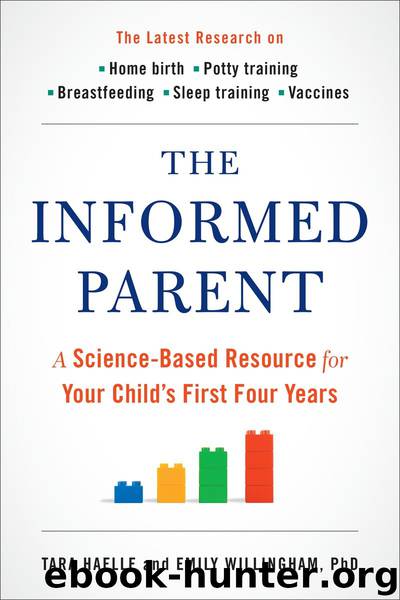The Informed Parent by Tara Haelle

Author:Tara Haelle
Language: eng
Format: epub
Publisher: Penguin Publishing Group
Published: 2016-04-04T16:00:00+00:00
What We Did: Tara’s first son loved Soothies pacifiers (and only those), but her second son had no interest in pacifiers at all. Emily’s first and third sons both loved their pacis and were loath to give them up, but ultimately both voluntarily did so at about the age of 3. One has apparently had no consequences, but the other one had a near miss with a crossbite. Her middle son, who never used one at all, had the most severe and frequent ear infections of any of her children.
WHEN GRANDMA SAYS HE’S SPOILED
The short answer is no, babies can’t be spoiled. Children don’t come with a “use by” date. They don’t rot morally or behaviorally from the inside out under the unwitting encouragement from parents who think they’re simply fulfilling fundamental needs. Infants and toddlers, those who cannot feed or clean or support themselves, won’t be spoiled by being fed and cleaned and supported physically and emotionally. Infants and toddlers are people, like you, but they don’t have friends or other forged relationships to turn to for their emotional and physical needs. They just have you. Their requests for support and help are no more bratty than when you call a friend or reach out to a spouse for emotional support after a particularly trying day.
Some research suggests that a perception that an infant or very young child can be “spoiled” can lead parents to misread a child’s needs and disregard them, to everyone’s detriment. The AAP assures parents that babies cannot be spoiled by having their needs addressed. This recognition is important to ensure that parents don’t ignore what a child needs out of fear of “spoiling” the child. That concern is very real, given that in a 1997 survey by Zero to Three, more than 50% of adults, including parents of young children, thought that a child who is only 6 months old can be spoiled. Even worse, 60% of grandparents and 44% of parents of young children in that survey of 3,000 adults thought that picking up a 3-month-old every time the child cries would spoil the child. Perhaps as a corollary to that, a 2009 Zero to Three survey of 1,615 parents of children from birth to 3 years found that most think that 6-month-olds don’t feel sadness or fear. Obviously, these data show a generational gap, with grandparents being more likely to call “spoiling” on situations that aren’t. The survey authors also found that household income was associated positively with the level of understanding about child development.
More specifically regarding infants, they don’t have the neural networks in place to be “spoiled” or to manipulate you in any intentional (or even unintentional) way. They are as unmanipulative as anyone you’re ever going to know, so enjoy it while you can, and, yes, “give in” to their basic requests for food, shelter, love, and comfort. Substitute “nurturing” for “spoiling,” and you’ll realize how critical it is that you do so.
Download
This site does not store any files on its server. We only index and link to content provided by other sites. Please contact the content providers to delete copyright contents if any and email us, we'll remove relevant links or contents immediately.
The Lost Art of Listening by Michael P. Nichols(7506)
Rich Dad Poor Dad by Robert T. Kiyosaki(6633)
We Need to Talk by Celeste Headlee(5615)
I Love You But I Don't Trust You by Mira Kirshenbaum(3876)
The Complete Idiot's Guide to Coping With Difficult People by Arlene Uhl(3149)
Rich Dad Poor Dad: What The Rich Teach Their Kids About Money - That The Poor And Middle Class Do Not! by Robert T. Kiyosaki(2958)
A Burst of Light by Audre Lorde(2607)
The Book You Wish Your Parents Had Read (and Your Children Will Be Glad That You Did) by Philippa Perry(2528)
Dealing with People You Can't Stand by Dr. Rick Brinkman(2460)
Life Hacks by Dan Marshall(2456)
An Odyssey by Daniel Mendelsohn(2309)
The Expectant Father by Armin A. Brott & Jennifer Ash(2273)
Teach Your Child How to Think by Edward De Bono(2159)
No Time to Say Goodbye(2118)
What I Need by J. Daniels(2082)
The 7 Habits Of Highly Effective Teens by Covey Sean(2080)
The Out-of-Sync Child by Carol Stock Kranowitz(2055)
The Anxious Generation by Jonathan Haidt(2051)
I Don't Belong to You by Keke Palmer(2005)
